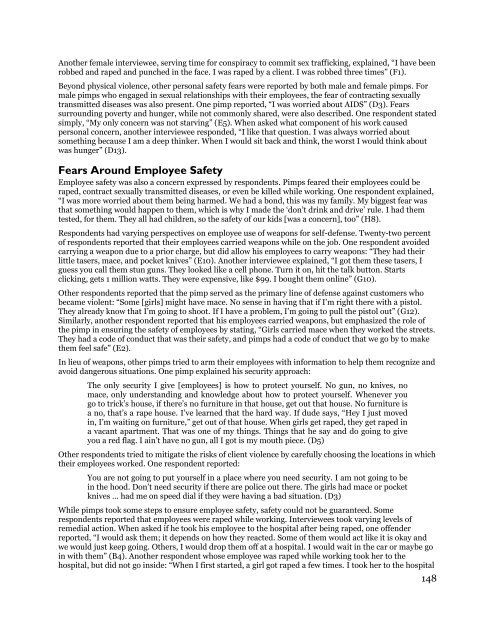413047-Underground-Commercial-Sex-Economy
413047-Underground-Commercial-Sex-Economy
413047-Underground-Commercial-Sex-Economy
Create successful ePaper yourself
Turn your PDF publications into a flip-book with our unique Google optimized e-Paper software.
Another female interviewee, serving time for conspiracy to commit sex trafficking, explained, “I have been<br />
robbed and raped and punched in the face. I was raped by a client. I was robbed three times” (F1).<br />
Beyond physical violence, other personal safety fears were reported by both male and female pimps. For<br />
male pimps who engaged in sexual relationships with their employees, the fear of contracting sexually<br />
transmitted diseases was also present. One pimp reported, “I was worried about AIDS” (D3). Fears<br />
surrounding poverty and hunger, while not commonly shared, were also described. One respondent stated<br />
simply, “My only concern was not starving” (E5). When asked what component of his work caused<br />
personal concern, another interviewee responded, “I like that question. I was always worried about<br />
something because I am a deep thinker. When I would sit back and think, the worst I would think about<br />
was hunger” (D13).<br />
Fears Around Employee Safety<br />
Employee safety was also a concern expressed by respondents. Pimps feared their employees could be<br />
raped, contract sexually transmitted diseases, or even be killed while working. One respondent explained,<br />
“I was more worried about them being harmed. We had a bond, this was my family. My biggest fear was<br />
that something would happen to them, which is why I made the ‘don’t drink and drive’ rule. I had them<br />
tested, for them. They all had children, so the safety of our kids [was a concern], too” (H8).<br />
Respondents had varying perspectives on employee use of weapons for self-defense. Twenty-two percent<br />
of respondents reported that their employees carried weapons while on the job. One respondent avoided<br />
carrying a weapon due to a prior charge, but did allow his employees to carry weapons: “They had their<br />
little tasers, mace, and pocket knives” (E10). Another interviewee explained, “I got them these tasers, I<br />
guess you call them stun guns. They looked like a cell phone. Turn it on, hit the talk button. Starts<br />
clicking, gets 1 million watts. They were expensive, like $99. I bought them online” (G10).<br />
Other respondents reported that the pimp served as the primary line of defense against customers who<br />
became violent: “Some [girls] might have mace. No sense in having that if I’m right there with a pistol.<br />
They already know that I’m going to shoot. If I have a problem, I’m going to pull the pistol out” (G12).<br />
Similarly, another respondent reported that his employees carried weapons, but emphasized the role of<br />
the pimp in ensuring the safety of employees by stating, “Girls carried mace when they worked the streets.<br />
They had a code of conduct that was their safety, and pimps had a code of conduct that we go by to make<br />
them feel safe” (E2).<br />
In lieu of weapons, other pimps tried to arm their employees with information to help them recognize and<br />
avoid dangerous situations. One pimp explained his security approach:<br />
The only security I give [employees] is how to protect yourself. No gun, no knives, no<br />
mace, only understanding and knowledge about how to protect yourself. Whenever you<br />
go to trick’s house, if there’s no furniture in that house, get out that house. No furniture is<br />
a no, that’s a rape house. I’ve learned that the hard way. If dude says, “Hey I just moved<br />
in, I’m waiting on furniture,” get out of that house. When girls get raped, they get raped in<br />
a vacant apartment. That was one of my things. Things that he say and do going to give<br />
you a red flag. I ain’t have no gun, all I got is my mouth piece. (D5)<br />
Other respondents tried to mitigate the risks of client violence by carefully choosing the locations in which<br />
their employees worked. One respondent reported:<br />
You are not going to put yourself in a place where you need security. I am not going to be<br />
in the hood. Don’t need security if there are police out there. The girls had mace or pocket<br />
knives … had me on speed dial if they were having a bad situation. (D3)<br />
While pimps took some steps to ensure employee safety, safety could not be guaranteed. Some<br />
respondents reported that employees were raped while working. Interviewees took varying levels of<br />
remedial action. When asked if he took his employee to the hospital after being raped, one offender<br />
reported, “I would ask them; it depends on how they reacted. Some of them would act like it is okay and<br />
we would just keep going. Others, I would drop them off at a hospital. I would wait in the car or maybe go<br />
in with them” (B4). Another respondent whose employee was raped while working took her to the<br />
hospital, but did not go inside: “When I first started, a girl got raped a few times. I took her to the hospital<br />
148


